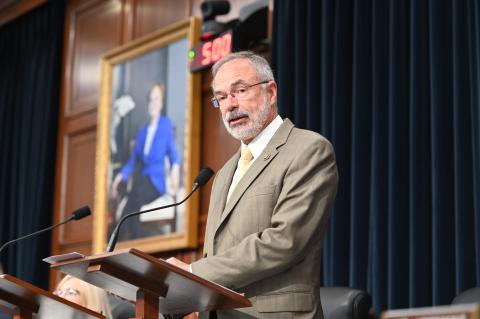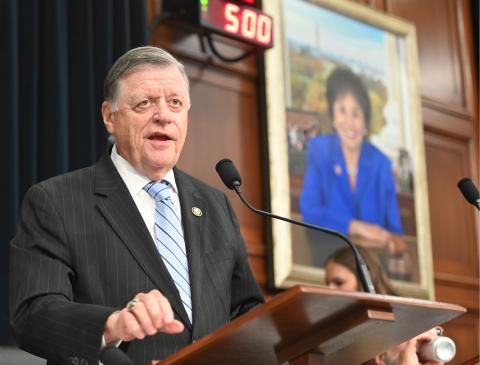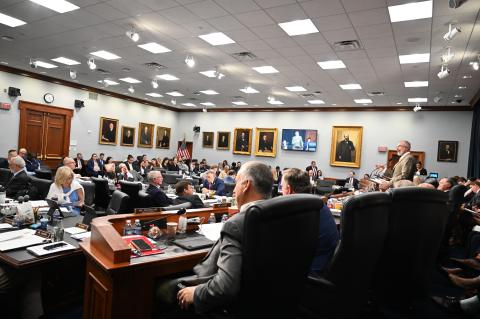Committee Approves FY26 Agriculture, Rural Development, Food and Drug Administration, and Related Agencies Appropriations Act
Washington, D.C. – Today, the House Appropriations Committee met to consider the Fiscal Year 2026 Agriculture, Rural Development, Food and Drug Administration, and Related Agencies Appropriations Act. The measure was approved by the Committee with a vote of 35 to 27.

Agriculture, Rural Development, Food and Drug Administration, and Related Agencies Subcommittee Chairman Andy Harris (R-MD) said, “The Agriculture, Rural Development, Food and Drug Administration, and Related Agencies Appropriations Act reflects a clear, conservative commitment to fiscal responsibility while ensuring that America’s farmers, ranchers, and rural communities remain a top priority. This legislation strengthens agricultural research, supports rural businesses and infrastructure, and safeguards our food and drug supply – all while cutting Biden-era waste. By investing in American-grown food and reducing reliance on foreign sources, we’re making our nation healthier, stronger, and more secure. America’s farmers feed the world, and the bill ensures they have the resources they deserve – without growing the burgeoning deficit.”

Chairman Tom Cole (R-OK) said, “Today’s full committee markup recognizes that the men and women who’ve worked the land for generations, raised livestock, and brought food to tables around the world deserve not just our gratitude – but policies that reflect their impact and value on our nation. This just-advanced FY26 bill champions President Trump’s farmer-first agenda and reflects the essential role of agriculture and rural communities in America’s future. It continues targeted investments in agricultural research, rural broadband, and animal and plant health – each of which strengthens our resilience and economic growth. Importantly, this legislation also takes action to preserve and protect U.S. farmland and ensure a safe food and drug supply. I commend Chairman Harris for delivering a measure that upholds both core missions and fiscal responsibility.”
Subcommittee Chairman Harris' opening remarks are available here.
Chairman Cole's opening remarks are available here.

Fiscal Year 2026 Agriculture, Rural Development, Food and Drug Administration, and Related Agencies Appropriations Act
The Agriculture, Rural Development, Food and Drug Administration, and Related Agencies Appropriations Act provides a total discretionary allocation of $25.523 billion, which is $1.163 billion (4.2%) below the Fiscal Year 2025 enacted level.
The bill prioritizes agencies and programs that protect our nation’s food and drug supply; support America’s farmers, ranchers, and rural communities; and ensure low-income Americans have access to nutrition programs. The bill is fiscally responsible and refocuses programs on their core mission while putting the health, safety, and prosperity of American producers and consumers first.
Key Takeaways
Champions U.S. farmers, agriculture, and rural communities by:
- Continuing critical investments in agriculture research, rural broadband, and animal and plant health programs.
- Providing funds to ensure the safety of food, drugs, and medical devices.
- Ensuring low-income Americans have access to nutrition programs.
- Reining in harmful regulations proposed during the Biden Administration that dictate how poultry and livestock producers raise and market their animals.
- Increasing resources for the Food Safety and Inspection Service to fund frontline meat and poultry inspectors and bolster support for state inspection programs.
- Providing a rider to block any revised energy standards for newly constructed homes financed by USDA that would increase costs for rural, lower-income households that was proposed during the Biden Administration.
Supports the Trump Administration and mandate of the American people by:
- Allocating OMB's requested total funding of $6.8 billion for the FDA to keep food, drugs, and devices safe and for initiatives to Make America Healthy Again.
- Delivering $1.15 billion for the Animal and Plant Health Inspection Service, which is a priority in the OMB budget to protect American agriculture from foreign pests and diseases.
- Codifying President Trump’s executive orders by prohibiting funding for DEI activities and ending federal censorship of free speech.
- Retaining the gene editing provision, which prohibits the “editing” of heritable genes or altering of genes that can be passed on to offspring.
- Maintaining “Buy American” provisions that maximize the federal government’s use of services, goods, products, and materials produced and offered in the United States.
- Closing the hemp loophole that has resulted in the proliferation of unregulated intoxicating hemp products, including Delta-8 and hemp flower, being sold online and in gas stations across the country.
Bolsters U.S. national security and border protections by:
- Addressing foreign ownership of U.S. agricultural land by improving the tracking system of foreign-owned land and adding the Secretary of Agriculture to the Committee on Foreign Investment in the United States to review agricultural transactions, including purchases made by China, Russia, North Korea, and Iran.
- Directing USDA to provide transparency into research funding spent collaborating with foreign governments, including China, Russia, North Korea, and Iran.
- Continuing a program to increase inspection of foreign drug manufacturing facilities in China and India.
- Providing adequate funding for land-grant universities to conduct agricultural research to ensure American producers can compete with China.
Safeguards American taxpayer dollars and preserves core functions by:
- Capturing DOGE savings by reducing salaries and expenses where appropriate to account for staffing reductions and reducing grant programs that housed canceled grants.
- Eliminating funding for the Biden-era Rural Partners Network initiative.
- Including no funds for climate hubs or climate corps.
A summary of the bill is available here.
During the markup, Committee Republicans also stood with the America First agenda and rejected Democrat amendments that would have:
- Prevented agencies from managing their workforce and disallowed federal employees from participating in voluntary resignation programs.
- Obstructed the USDA from reviewing resources.
- Unnecessarily targeted DOGE and its mandated work to streamline government.
- Banned participation in patriotic military events.
- Expanded unfettered access to the abortion pill and stripped language directing the FDA to ensure safety of the drug.
- Funded polarizing diversity, equity, and inclusion (DEI) and critical race theory (CRT) initiatives.
Adopted Amendments
- Harris (Manager’s Amendment) – Makes technical, bipartisan changes to the bill and report.
- The amendment was adopted by voice vote.
- Hinson #1 – Strengthened support for nutrition assistance to mothers, infants, and children, while rescinding Biden-era funding to supercharge the IRS.
- The amendment was adopted by voice vote.
- Wasserman Schultz #3 – Sustains investment in programs that educate youth about the harmful effects of vaping and tobacco use.
- The amendment was adopted by voice vote.
- Letlow #1 – Initiates a report on domestic infant formula supply to strengthen oversight, improve resiliency, and understand challenges.
- The amendment was adopted by a vote of 34 to 27.
- Pingree #4 – Enhances food loss and waste reduction efforts.
- The amendment was adopted by voice vote.
- Underwood #5 – Expands Rural Development Hospital Technical Assistance to include expansion of maternal health services.
- The amendment was adopted by voice vote.
- Republican En Bloc - Includes the Women, Infants and Children (WIC) program in a USDA study on a “Buy American” requirement, protects traditional marriage values, and provides funding for the Office of Urban Agriculture, with a cost share requirement on grants made through the program.
- The amendment was adopted by a vote of 35 to 27.
- Gluesenkamp Perez #1 – Directs a report to find ways to increase market competition and improve access to infant formula.
- The amendment was adopted by voice vote.
Bill text, before adoption of amendments, is available here.
Bill report, before adoption of amendments, is available here.
A table of included Community Project Funding requests is available here.
###
